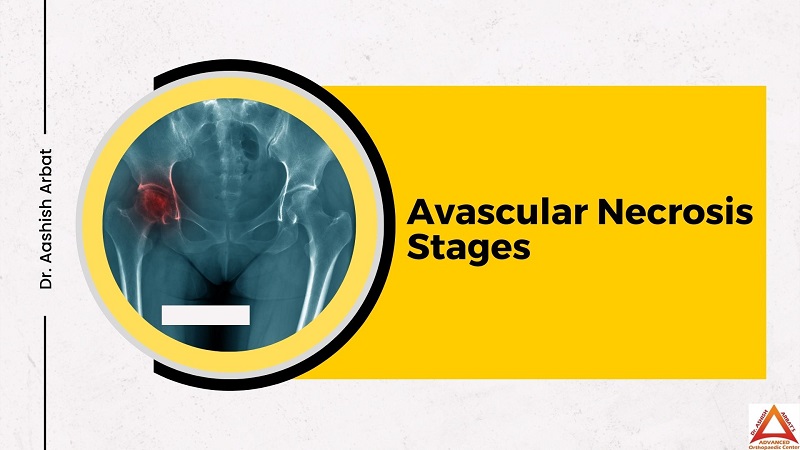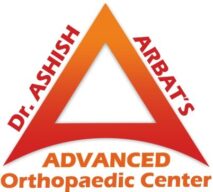
Avascular necrosis is the death of bone tissue due to lack of blood supply, which can lead to bone collapse and arthritis. Avascular necrosis can be categorized into five different stages. To learn more about avascular necrosis stages; read on.
Dr. Aashish Arbat, the most honoured knee replacement surgeon in Pune in this blog explains the Avascular necrosis stages Radiology, causes, risk factors, and how to avoid Avascular necrosis.
Contents
Avascular Necrosis Stages
- Stage 1: Radiographic variations are absent or show minor osteopenia. An MRI scan is needed for identification. The beginning of this illness is asymptomatic. Standard radiographs are normal.
- Stage 2: This phase is categorized by sclerosis of the superior central portion of the joint head and/or osteopenia and/or subchondral cysts.
- Stage 3: In this step, the articular surface is dejected so that the round contour is conceded, without being significantly deformed. This causes a joint space contraction. A plain radiograph displays a crescent sign.
- Stage 4: This phase is considered a wide breakdown of the subchondral bone and ruin of the primary trabecular pattern. This can cause secondary arthritis.
- Stage 5: The ultimate stage is where both articular surfaces get affected, which leads to a dysfunctional joint.
Injury that stops or slows blood flow to a bone is the main cause of AVN. Let’s discuss some other causes too.
Avascular Necrosis Causes
- Drinking too much alcohol
- Smoking
- Taking high doses of corticosteroids for a long time can increase fatty substances (lipids) in the blood, which can block arteries
- Childhood diseases including Legg-Calve Perthes disease
- Chemotherapy or radiation
- High cholesterol
- Gaucher’s disease
- HIV infection
- Lupus
- Organ transplants
- Pancreatitis
- Blood disorders
Stage 2, treatment aims to stop extra bone loss and manage indications.
Avascular Necrosis Stage 2 Treatment
Here are some approaches as mentioned by Dr. Arbat the most esteemed knee replacement doctor in Pune.
- Medications
- Therapy
- Surgical Procedures
AVN stage 3 Symptoms
- Minor or severe pain in or around the affected joint
- Groin discomfort that spreads down to the knee
- The uneasiness that happens when putting weight on the hip or knee
- Joint pain is enough to limit movement
Avascular Necrosis Stage 3 Treatment
- Core decompression: A knee replacement surgeon takes away part of the inner layer of bone to cut pain and activate the production of strong bone tissue and new blood vessels.
- Bone transplant (graft): This practice can help support the area of bone affected by avascular necrosis.
- Cold packs
- Heat treatment
- Rest
- Nonsteroidal anti-inflammatory drugs (NSAIDs)
- Physical therapy to comfort joint inflammation and increase range of motion.
- If all other treatments are unsuccessful, a total hip arthroplasty is the only possibility
Avascular Necrosis Stage 4 Treatment
- Core decompression
- Bone transplant
- Bone reshaping
- Joint replacement
- Regenerative medicine treatment
How Long Can You Live With Avascular Necrosis?
If you are looking to know how long can you live with avascular necrosis; book an appointment and meet Dr. Aashish Arbat a globally admired Orthopedic Surgeon in Pune. He is a M.Ch – Orthopaedics, FRCS and has been practising as an Orthopedic Surgeon for the last 22 years. Dr. Arbat provides diagnosis and suggests surgical and nonsurgical treatment options to patients experiencing complications from AVN of the hip. How long you can live with avascular necrosis is case-specific.
Besides medication, Dr. Aashish Arbat, recommends the following avascular necrosis stage 3 treatment without surgery.
- Rest, this involves restraining physical activity or using crutches
- Exercises, suggested by a physical therapist, can recover joint range of motion.
- Electrical stimulation can encourage the body to grow new bones.
Prevention
To lessen the hazard of avascular necrosis and improve general health:
- Restrict alcohol
- Maintain low cholesterol levels
- Monitor steroid use
- Quit smoking
Wrapping up
If you have any concerns or notice any symptoms of avascular necrosis; seek medical advice immediately. Consult an Orthopedic Surgeon for proper assessment and supervision before you reach the critical avascular necrosis stages.
FAQ
How fast does avascular necrosis progress?
The progression differs, but usually, it can develop fairly fast. Let’s break it down: AVN can develop from stage one to stage four in less than 18 months, with some patients experiencing quick deterioration in just a few months.
Literature recommends a 50% possibility of progression over a three years.
Can avascular necrosis affect any bone in the body?
Yes, avascular necrosis can affect any bone in the body, however, it generally happens in the hip joint.
What happens if avascular necrosis is left untreated?
Avascular necrosis if left untreated, can lead to enduring impairment to the bone and joint, causing joint collapse and substantial effect on a person’s quality of life.

